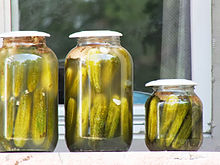Pickling
![]()
This article is about food preservation; for the joining process, see assembling; for the placing of incense grains on a glowing coal in the censer in liturgy, see navicular.
Pickling is a way of preserving and seasoning food. Pickling is a form of pickling food.
For example, the food is completely covered with a spicy vinegar broth or salt water. In Italy and other Mediterranean countries, foods are also pickled in olive oil. Pickled foods include gherkins, mustard pickles, pumpkin, baby corn, pearl onions, beetroot, Bismarck herring, sherry sild, pickled eggs and other foods.
In the case of vegetables, the decoction should be poured hot over the food so that any fermentation process that may occur is prevented for as long as possible. Cellophane or preserving skin is used for air sealing, which is set. Today, canning jars are more commonly used, as they are better at excluding germs and ensuring airtightness. Large jars, so-called ports or ceramic jars can also be used.
A speciality is the acid pickling of pickled cucumbers and other sour vegetables, where lactic acid fermentation is desired as a type of natural fermentation and can be deliberately promoted by the addition of bacterial cultures. The lactic acid bacteria suppress the development of undesirable bacteria and yeasts and allow for a very long shelf life. It is believed that foods fermented in this way are beneficial to health. In addition to lactic acid, alcohol and vinegar may be produced in small quantities. Moreover, since carbon dioxide is formed regularly, the containers cannot be sealed airtight. Traditionally, the vegetables were kept below the surface of the water by weighing them down with stones to prevent contact with the air. Today, a fermentation stopper is often used. Creamy yeast forming on the surface can simply be skimmed off.
Storage should be dark and cool and, if possible, no dust should be able to get into the brew. Pickled foods can be stored and consumed for about a year, but premature spoilage is always possible and occasional checks are therefore recommended. Many common molds are toxic and can cause chronic illness and even cancer. This also applies to some types of bacteria, which may be more difficult to notice. A strong turbidity or a noticeable odor may indicate this.
Sterile pickled foods which have not undergone lactic fermentation should be consumed within a few days, as microorganisms enter the broth with the first removal. Only clean cutlery should be used for removal, which limits the introduction of harmful microorganisms. Also by subsequent cooling the spoilage can be strongly delayed.

Pickling of cucumbers, here in a Hungarian preparation method with pieces of sourdough bread to promote lactic acid fermentation
.jpg)
Slices of pickled beetroot with the crayon knife with decorative wavy surface.
See also
- Preserving
Search within the encyclopedia